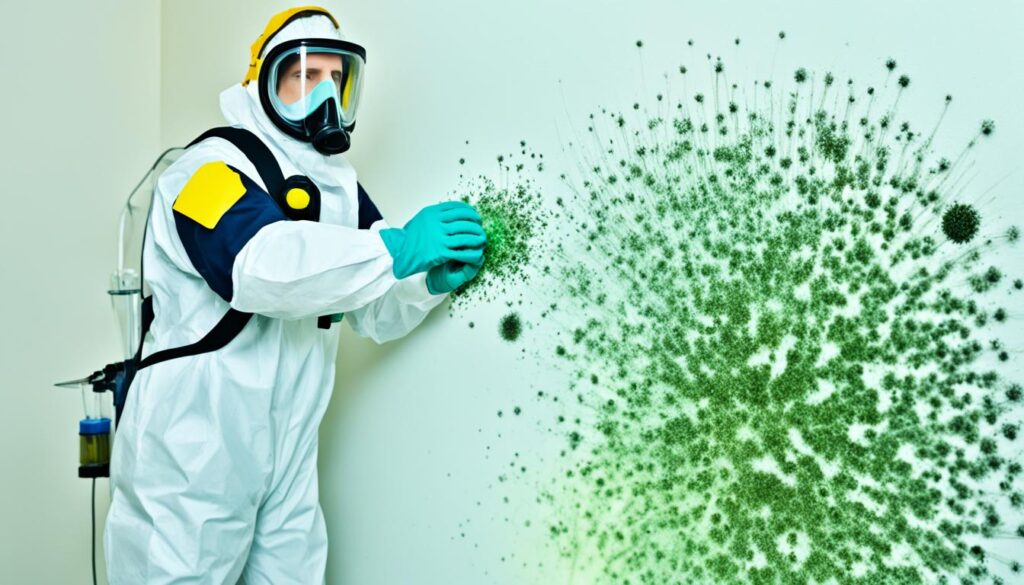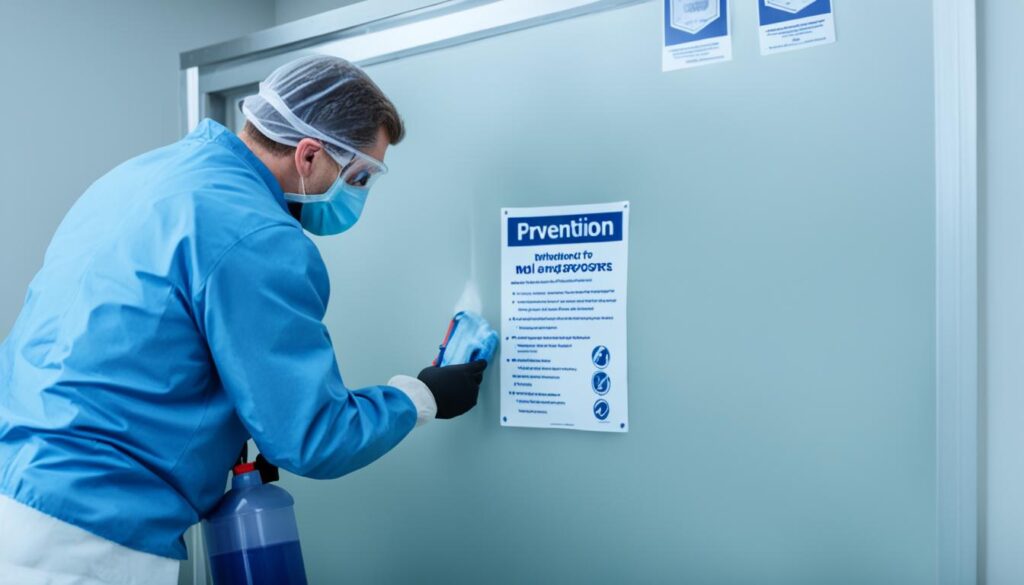
Mold Spores Health Risks & Prevention Tips
Mold spores can not only be unsightly but also pose significant health risks. Whether visible or hidden, mold growth in your home can lead to various health problems that can be harmful to you and your family. It is crucial to understand the potential dangers mold spores present and take preventive measures to keep your living environment safe and healthy.
Key Takeaways:
- Unaddressed mold spores can lead to serious health issues.
- Mold spores can cause respiratory problems, allergies, and asthma.
- Children, the elderly, and individuals with weakened immune systems are especially vulnerable.
- Prevention tips include controlling moisture levels, proper ventilation, fixing leaks, using dehumidifiers, and regular inspections.
- Contact a professional mold assessment service like Fix Mold Miami at 305-465-6653 for expert assistance.
Understanding Mold Spores and their Health Effects
In this section, we will delve into the intricate nature of mold spores and uncover their profound impact on our health. Understanding the characteristics of mold spores is crucial in comprehending the risks they pose and taking appropriate measures to mitigate their detrimental effects.
Mold spores are microscopic organisms that thrive in damp and humid environments, reproducing through the release of tiny spores into the air. These spores are resilient and can easily travel through the air, settling on surfaces and multiplying rapidly under favorable conditions.

The health effects of mold spores can vary depending on an individual’s sensitivity, the duration and intensity of exposure, and the type of mold. When inhaling or coming into contact with mold spores, individuals may experience a range of health problems, particularly related to respiratory issues.
“Exposure to mold spores can trigger allergic reactions, including sneezing, coughing, and nasal congestion. It can also exacerbate existing respiratory conditions such as asthma and cause or worsen allergic rhinitis.”
Furthermore, prolonged exposure to mold spores has been linked to more severe health problems, including fungal infections and mycotoxin toxicity. These toxins, produced by certain types of mold, can affect the nervous system, respiratory system, and overall well-being.
Vulnerable groups, such as children, the elderly, and individuals with weakened immune systems, are particularly susceptible to the health risks associated with mold spores. It’s crucial to prioritize preventive measures to safeguard their well-being and ensure a healthy living environment for all.
Common health problems caused by mold spores:
- Respiratory issues, including coughing, wheezing, and shortness of breath
- Allergic reactions, such as sneezing, itching, and skin rashes
- Asthma attacks and increased asthma symptoms
- Allergic rhinitis, with symptoms similar to hay fever
- Fungal infections, affecting the skin, lungs, or other organs
- Mycotoxin toxicity, which can cause neurological, respiratory, and gastrointestinal problems
By gaining a comprehensive understanding of mold spores and their potential health effects, individuals can take proactive measures to prevent mold growth and minimize exposure. In the next section, we will explore practical prevention tips that can help create a mold-free environment in your home.
Prevention Tips for Mold Spores
To protect your home from the potential health risks of mold spores, it’s essential to implement preventive measures. By taking proactive steps, you can minimize the chances of mold growth and keep your living spaces safe and healthy. Here are some valuable prevention tips to consider:
- Control Moisture Levels: Moisture is a primary factor that contributes to mold growth. Regularly check for and fix any sources of water leakage, such as leaking pipes, faucets, or roofs. Additionally, maintain proper ventilation in bathrooms, kitchens, and other areas prone to moisture accumulation.
- Utilize Proper Ventilation: Ensure that your home has adequate ventilation to prevent moisture buildup. Use exhaust fans or open windows when cooking, showering, or doing activities that generate moisture. Efficient airflow helps keep indoor humidity levels in check, reducing the risk of mold growth.
- Fix Leaks Promptly: Even small leaks can provide the ideal environment for mold to thrive. Regularly inspect your plumbing system, roof, and windows for any signs of leaks or water damage. Fix them as soon as possible to prevent moisture from seeping into your home.
- Utilize Dehumidifiers: In areas with high humidity, such as basements and laundry rooms, consider using dehumidifiers. These devices extract excess moisture from the air, helping to create unfavorable conditions for mold growth.
- Regular Inspections and Mold Assessments: Schedule regular inspections of your home to identify any signs of mold growth early on. If you suspect mold or are unsure about the presence of mold spores, it’s crucial to seek professional mold assessment services. Professionals can detect hidden mold and provide appropriate remediation techniques to address any issues.
By following these prevention tips, you can significantly reduce the risk of mold spores taking hold in your home. By maintaining a clean and dry environment, you’ll safeguard your health and create a more comfortable living space.
“Prevention is better than cure.”
Detection of Mold Growth:
While prevention is key, it’s essential to have a basic understanding of identifying mold growth in your home. Here are some common signs that may indicate the presence of mold:
- Visible Mold: Mold commonly appears as black, green, or brown patches on walls, ceilings, floors, or other surfaces. Keep an eye out for any unusual discoloration.
- Musty Odor: A pungent, earthy smell may indicate hidden mold growth. If you notice a persistent musty odor in your home, it’s crucial to investigate its source.
- Water Stains: Discoloration or stains on walls, ceilings, or floors, particularly in areas susceptible to moisture, may suggest mold growth behind the surface.
If you observe any of these signs, it’s crucial to address the issue promptly to prevent further mold development and potential health risks.

Conclusion
In conclusion, it is crucial to take mold spores seriously and prioritize preventive measures to protect ourselves from potential health risks. By understanding the nature of mold spores and their effects on our health, we can take the necessary steps to keep our homes and well-being safe.
Implementing the prevention tips discussed in this article can go a long way in minimizing the presence of mold spores in our living spaces. Controlling moisture levels, ensuring proper ventilation, and promptly fixing any leaks are essential practices to prevent mold growth.
Regular inspections and professional mold assessments, such as those provided by Fix Mold Miami, can help detect and address mold-related issues at an early stage. Being proactive in mitigating mold spores can help avoid respiratory issues, allergies, and other health problems associated with exposure to mold.
Remember, prevention is key when it comes to mold spores. By following these simple yet effective prevention tips, we can create a healthier living environment for ourselves and our loved ones.




